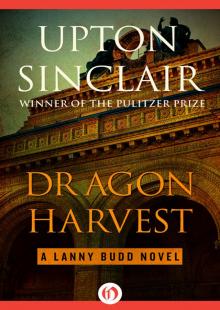- Home
- Upton Sinclair
The Jungle Page 16
The Jungle Read online
Page 16
It was a cruel lesson; but then Marija was headstrong—she should have listened to those who had had experience. The next time she would know her place, as the forelady expressed it; and so Marija went out, and the family faced the problem of an existence again.
It was especially hard this time, for Ona was to be confined before long, and Jurgis was trying hard to save up money for this. He had heard dreadful stories of the midwives, who grow as thick as fleas in Packingtown; and he had made up his mind that Ona must have a man-doctor. Jurgis could be very obstinate when he wanted to, and he was in this case, much to the dismay of the women, who felt that a man-doctor was an impropriety, and that the matter really belonged to them. The cheapest doctor they could find would charge them fifteen dollars, and perhaps more when the bill came in; and here was Jurgis, declaring that he would pay it, even if he had to stop eating in the meantime!
Marija had only about twenty-five dollars left. Day after day she wandered about the yards begging a job, but this time without hope of finding it. Marija could do the work of an able-bodied man, when she was cheerful, but discouragement wore her out easily, and she would come home at night a pitiable object. She learned her lesson this time, poor creature; she learned it ten times over. All the family learned it along with her—that when you have once got a job in Packingtown, you hang on to it, come what will.
Four weeks Marija hunted, and half of a fifth week. Of course she stopped paying her dues to the union. She lost all interest in the union, and cursed herself for a fool that she had ever been dragged into one. She had about made up her mind that she was a lost soul, when somebody told her of an opening, and she went and got a place as a “beef-trimmer.” She got this because the boss saw that she had the muscles of a man, and so he discharged a man and put Marija to do his work, paying her a little more than half what he had been paying before.
When she first came to Packingtown, Marija would have scorned such work as this. She was in another canning-factory, and her work was to trim the meat of those diseased cattle that Jurgis had been told about not long before. She was shut up in one of the rooms where the people seldom saw the daylight; beneath her were the chilling-rooms, where the meat was frozen, and above her were the cooking-rooms; and so she stood on an ice-cold floor, while her head was often so hot that she could scarcely breathe. Trimming beef off the bones by the hundred-weight, while standing up from early morning till late at night, with heavy boots on and the floor always damp and full of puddles, liable to be thrown out of work indefinitely because of a slackening in the trade, liable again to be kept overtime in rush seasons, and be worked till she trembled in every nerve and lost her grip on her slimy knife, and gave herself a poisoned wound—that was the new life that unfolded itself before Marija. But because Marija was a human horse she merely laughed and went at it; it would enable her to pay her board again, and keep the family going. And as for Tamoszius—well, they had waited a long time, and they could wait a little longer. They could not possibly get along upon his wages alone, and the family could not live without hers. He could come and visit her, and sit in the kitchen and hold her hand, and he must manage to be content with that. But day by day the music of Tamoszius’s violin became more passionate and heart-breaking ; and Marija would sit with her hands clasped and her cheeks wet and all her body a-tremble, hearing in the wailing melodies the voices of the unborn generations which cried out in her for life.
Marija’s lesson came just in time to save Ona from a similar fate. Ona, too, was dissatisfied with her place, and had far more reason than Marija. She did not tell half of her story at home, because she saw it was a torment to Jurgis, and she was afraid of what he might do. For a long time Ona had seen that Miss Henderson, the forelady in her department, did not like her. At first she thought it was the old-time mistake she had made in asking for a holiday to get married. Then she concluded it must be because she did not give the forelady a present occasionally—she was the kind that took presents from the girls, Ona learned, and made all sorts of discriminations in favor of those who gave them. In the end, however, Ona discovered that it was even worse than that. Miss Henderson was a newcomer, and it was some time before rumor made her out; but finally it transpired that she was a kept-woman, the former mistress of the superintendent of a department in the same building. He had put her there to keep her quiet, it seemed—and that not altogether with success, for once or twice they had been heard quarrelling. She had the temper of a hyena, and soon the place she ran was a witch’s caldron. There were some of the girls who were of her own sort, who were willing to toady to her and flatter her; and these would carry tales about the rest, and so the furies were unchained in the place. Worse than this, the woman lived in a bawdy-house down-town, with a coarse, red-faced Irishman named Connor, who was the boss of the loading-gang outside, and would make free with the girls as they went to and from their work. In the slack seasons some of them would go with Miss Henderson to this house down-town-in fact, it would not be too much to say that she managed her department at Brown’s in conjunction with it. Sometimes women from the house would be given places alongside of decent girls, and after other decent girls had been turned off to make room for them. When you worked in this woman’s department the house down-town was never out of your thoughts all day—there were always whiffs of it to be caught, like the odor of the Packingtown rendering-plants at night, when the wind shifted suddenly. There would be stories about it going the rounds; the girls opposite you would be telling them and winking at you. In such a place Ona would not have stayed a day, but for starvation; and, as it was, she was never sure that she could stay the next day. She understood now that the real reason that Miss Henderson hated her was that she was a decent married girl; and she knew that the talebearers and the toadies hated her for the same reason, and were doing their best to make her life miserable.
But there was no place a girl could go in Packingtown, if she was particular about things of this sort; there was no place in it where a prostitute could not get along better than a decent girl. Here was a population, low-class and mostly foreign, hanging always on the verge of starvation, and dependent for its opportunities of life upon the whim of men every bit as brutal and unscrupulous as the old-time slave-drivers; under such circumstances immorality was exactly as inevitable, and as prevalent, as it was under the system of chattel slavery. Things that were quite unspeakable went on there in the packing-houses all the time, and were taken for granted by everybody ; only they did not show, as in the old slavery times, because there was no difference in color between master and slave.
One morning Ona stayed home, and Jurgis had the man-doctor, according to his whim, and she was safely delivered of a fine baby. It was an enormous big boy, and Ona was such a tiny creature herself, that it seemed quite incredible. Jurgis would stand and gaze at the stranger by the hour, unable to believe that it had really happened.
The coming of this boy was a decisive event with Jurgis. It made him irrevocably a family man; it killed the last lingering impulse that he might have had to go out in the evenings and sit and talk with the men in the saloons. There was nothing he cared for now so much as to sit and look at the baby. This was very curious, for Jurgis had never been interested in babies before. But then, this was a very unusual sort of a baby. He had the brightest little black eyes, and little black ringlets all over his head; he was the living image of his father, everybody said—and Jurgis found this a fascinating circumstance. It was sufficiently perplexing that this tiny mite of life should have come into the world at all in the manner that it had; that it should have come with a comical imitation of its father’s nose was simply uncanny.
Perhaps, Jurgis thought, this was intended to signify that it was his baby; that it was his and Ona‘s, to care for all its life. Jurgis had never possessed anything nearly so interesting—a baby was, when you came to think about it, assuredly a marvellous possession. It would grow up to be a man, a human soul, with a personality all its own,
a will of its own! Such thoughts would keep haunting Jurgis, filling him with all sorts of strange and almost painful excitements. He was wonderfully proud of little Antanas; he was curious about all the details of him—the washing and the dressing and the eating and the sleeping of him, and asked all sorts of absurd questions. It took him quite a while to get over his alarm at the incredible shortness of the little creature’s legs.
Jurgis had, alas, very little time to see his baby; he never felt the chains about him more than just then. When he came home at night, the baby would be asleep, and it would be the merest chance if he awoke before Jurgis had to go to sleep himself. Then in the morning there was no time to look at him, so really the only chance the father had was on Sundays. This was more cruel yet for Ona, who ought to have stayed home and nursed him, the doctor said, for her own health as well as the baby’s; but Ona had to go to work, and leave him for Teta Elzbieta to feed upon the pale blue poison that was called milk at the corner-grocery. Ona’s confinement lost her only a week’s wages—she would go to the factory the second Monday, and the best that Jurgis could persuade her was to ride in the car, and let him run along behind and help her to Brown’s when she alighted. After that it would be all right, said Ona, it was no strain sitting still sewing hams all day; and if she waited longer she might find that her dreadful forelady had put some one else in her place. That would be a greater calamity than ever now, Ona continued, on account of the baby. They would all have to work harder now on his account. It was such a responsibility—they must not have the baby grow up to suffer as they had. And this indeed had been the first thing that Jurgis had thought of himself—he had clenched his hands and braced himself anew for the struggle, for the sake of that tiny mite of human possibility.
And so Ona went back to Brown’s and saved her place and a week’s wages; and so she gave herself some one of the thousand ailments that women group under the title of “womb-trouble,” and was never again a well person as long as she lived. It is difficult to convey in words all that this meant to Ona; it seemed such a slight offence, and the punishment was so out of all proportion, that neither she nor any one else ever connected the two. “Womb-trouble” to Ona did not mean a specialist’s diagnosis, and a course of treatment, and perhaps an operation or two; it meant simply headaches and pains in the back, and depression and heartsickness, and neuralgia when she had to go to work in the rain. The great majority of the women who worked in Packingtown suffered in the same way, and from the same cause, so it was not deemed a thing to see the doctor about; instead Ona would try patent medicines, one after another, as her friends told her about them. As these all contained alcohol, or some other stimulant, she found that they all did her good while she took them; and so she was always chasing the phantom of good health, and losing it because she was too poor to continue.
ELEVEN
DURING THE summer the packing-houses were in full activity again, and Jurgis made more money. He did not make so much, however, as he had the previous summer, for the packers took on more hands. There were new men every week, it seemed—it was a regular system ; and this number they would keep over to the next slack season, so that every one would have less than ever. Sooner or later, by this plan, they would have all the floating labor of Chicago trained to do their work. And how very cunning a trick was that! The men were to teach new hands, who would some day come and break their strike; and meantime they were kept so poor that they could not prepare for the trial!
But let no one suppose that this superfluity of employees meant easier work for any one! On the contrary, the speeding-up seemed to be growing more savage all the time; they were continually inventing new devices to crowd the work on—it was for all the world like the thumb-screw of the mediaeval torture-chamber. They would get new pace-makers and pay them more; they would drive the men on with new machinery—it was said that in the hog-killing rooms the speed at which the hogs moved was determined by clock-work, and that it was increased a little every day. In piece-work they would reduce the time, requiring the same work in a shorter time, and paying the same wages; and then, after the workers had accustomed themselves to this new speed, they would reduce the rate of payment to correspond with the reduction in time! They had done this so often in the canning establishments that the girls were fairly desperate ; their wages had gone down by a full third in the past two years, and a storm of discontent was brewing that was likely to break any day. Only a month after Marija had become a beef-trimmer the canning-factory that she had left posted a cut that would divide the girls’ earnings almost squarely in half; and so great was the indignation at this that they marched out without even a parley, and organized in the street outside. One of the girls had read somewhere that a red flag was the proper symbol for oppressed workers, and so they mounted one, and paraded all about the yards, yelling with rage. A new union was the result of this outburst, but the impromptu strike went to pieces in three days, owing to the rush of new labor. At the end of it the girl who had carried the red flag went downtown and got a position in a great department store, at a salary of two dollars and a half a week.
Jurgis and Ona heard these stories with dismay, for there was no telling when their own time might come. Once or twice there had been rumors that one of the big houses was going to cut its unskilled men to fifteen cents an hour, and Jurgis knew that if this was done, his turn would come soon. He had learned by this time that Packingtown was really not a number of firms at all, but one great firm, the Beef Trust.15 And every week the managers of it got together and compared notes, and there was one scale for all the workers in the yards and one standard of efficiency. Jurgis was told that they also fixed the price they would pay for beef on the hoof and the price of all dressed meat in the country; but that was something he did not understand or care about.
The only one who was not afraid of a cut was Marija, who congratulated herself, somewhat naïvely, that there had been one in her place only a short time before she came. Marija was getting to be a skilled beef-trimmer, and was mounting to the heights again. During the summer and fall Jurgis and Ona managed to pay her back the last penny they owed her, and so she began to have a bank account. Tamoszius had a bank account also, and they ran a race, and began to figure upon household expenses once more.
The possession of vast wealth entails cares and responsibilities, however, as poor Marija found out. She had taken the advice of a friend and invested her savings in a bank on Ashland Avenue. Of course she knew nothing about it, except that it was big and imposing—what possible chance has a poor foreign working-girl to understand the banking business, as it is conducted in this land of frenzied finance? So Marija lived in continual dread lest something should happen to her bank, and would go out of her way mornings to make sure that it was still there. Her principal thought was of fire, for she had deposited her money in bills, and was afraid that if they were burned up the bank would not give her any others. Jurgis made fun of her for this, for he was a man and was proud of his superior knowledge, telling her that the bank had fire-proof vaults, and all its millions of dollars hidden safely away in them.
However, one morning Marija took her usual detour, and, to her horror and dismay, saw a crowd of people in front of the bank, filling the avenue solid for half a block. All the blood went out of her face for terror. She broke into a run, shouting to the people to ask what was the matter, but not stopping to hear what they answered, till she had come to where the throng was so dense that she could no longer advance. There was a “run on the bank,” they told her then, but she did not know what that was, and turned from one person to another, trying in an agony of fear to make out what they meant. Had something gone wrong with the bank? Nobody was sure, but they thought so. Couldn’t she get her money? There was no telling; the people were afraid not, and they were all trying to get it. It was too early yet to tell anything—the bank would not open for nearly three hours. So in a frenzy of despair Marija began to claw her way toward the doors of this building,
through a throng of men, women, and children, all as excited as herself. It was a scene of wild confusion, women shrieking and wringing their hands and fainting, and men fighting and trampling down everything in their way. In the midst of the mêlée Marija recollected that she did not have her bank-book, and could not get her money anyway, so she fought her way out and started on a run for home. This was fortunate for her, for a few minutes later the police-reserves arrived.
In half an hour Marija was back, Teta Elzbieta with her, both of them breathless with running and sick with fear. The crowd was now formed in a line, extending for several blocks, with half a hundred policemen keeping guard, and so there was nothing for them to do but to take their places at the end of it. At nine o‘clock the bank opened and began to pay the waiting throng; but then, what good did that do Marija, who saw three thousand people before her—enough to take out the last penny of a dozen banks?
To make matters worse a drizzling rain came up, and soaked them to the skin; yet all the morning they stood there, creeping slowly toward the goal—all the afternoon they stood there, heart-sick, seeing that the hour of closing was coming, and that they were going to be left out. Marija made up her mind that, come what might, she would stay there and keep her place; but as nearly all did the same, all through the long, cold night, she got very little closer to the bank for that. Toward evening Jurgis came; he had heard the story from the children, and he brought some food and dry wraps, which made it a little easier.

 Prince Hagen
Prince Hagen Dragon Harvest
Dragon Harvest The Jungle
The Jungle Sylvia's Marriage
Sylvia's Marriage Oil! A Novel by Upton Sinclair
Oil! A Novel by Upton Sinclair The Coal War: A Novel
The Coal War: A Novel Presidential Agent
Presidential Agent World's End
World's End The Second-Story Man
The Second-Story Man O Shepherd, Speak!
O Shepherd, Speak! Wide Is the Gate
Wide Is the Gate The Return of Lanny Budd
The Return of Lanny Budd One Clear Call I
One Clear Call I 100%: the Story of a Patriot
100%: the Story of a Patriot The Machine
The Machine Presidential Mission
Presidential Mission A Cadet's Honor: Mark Mallory's Heroism
A Cadet's Honor: Mark Mallory's Heroism Between Two Worlds
Between Two Worlds World's End (The Lanny Budd Novels)
World's End (The Lanny Budd Novels) Between Two Worlds (The Lanny Budd Novels)
Between Two Worlds (The Lanny Budd Novels) The Coal War
The Coal War Presidential Agent (The Lanny Budd Novels)
Presidential Agent (The Lanny Budd Novels) Oil (filmed as There Will Be Blood)
Oil (filmed as There Will Be Blood) Wide Is the Gate (The Lanny Budd Novels)
Wide Is the Gate (The Lanny Budd Novels)